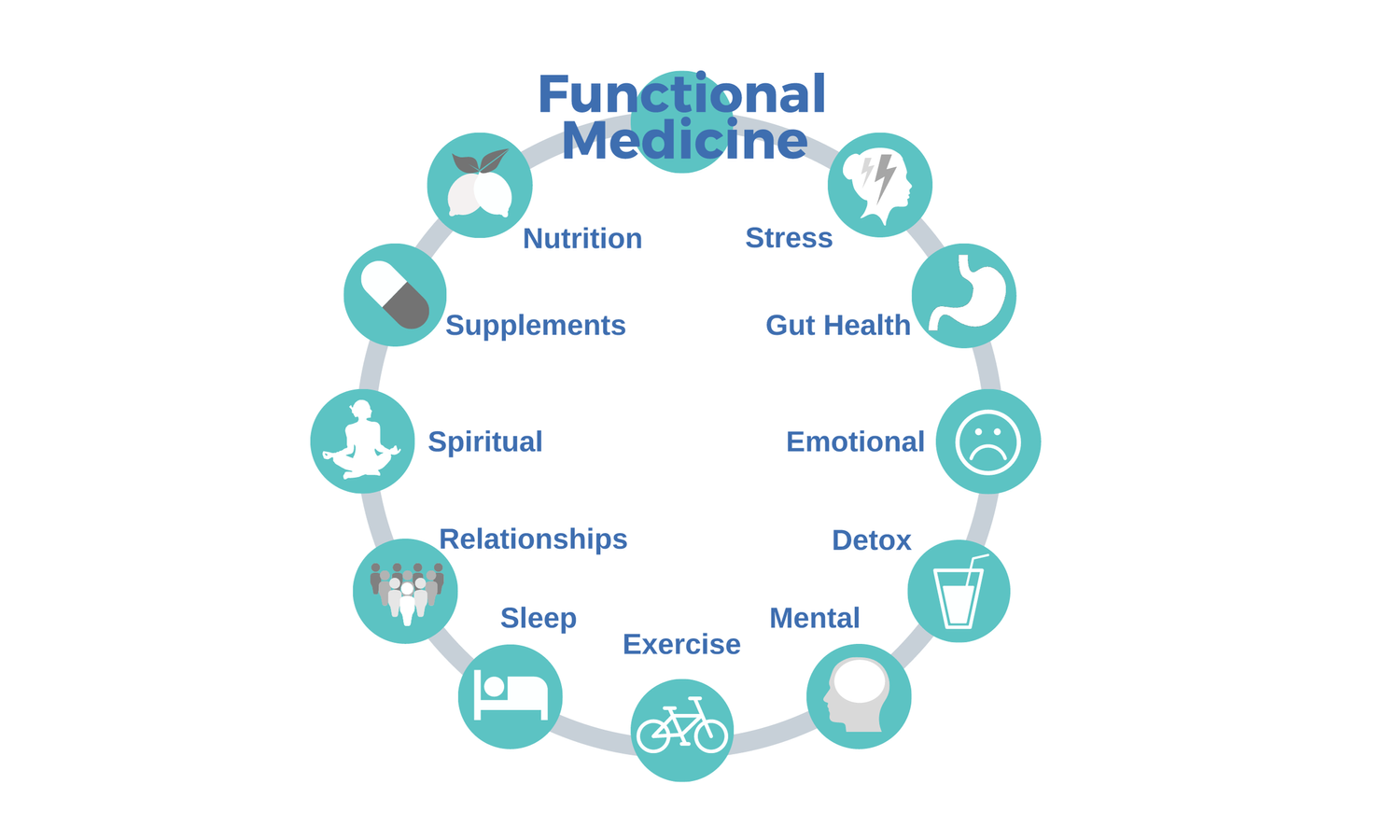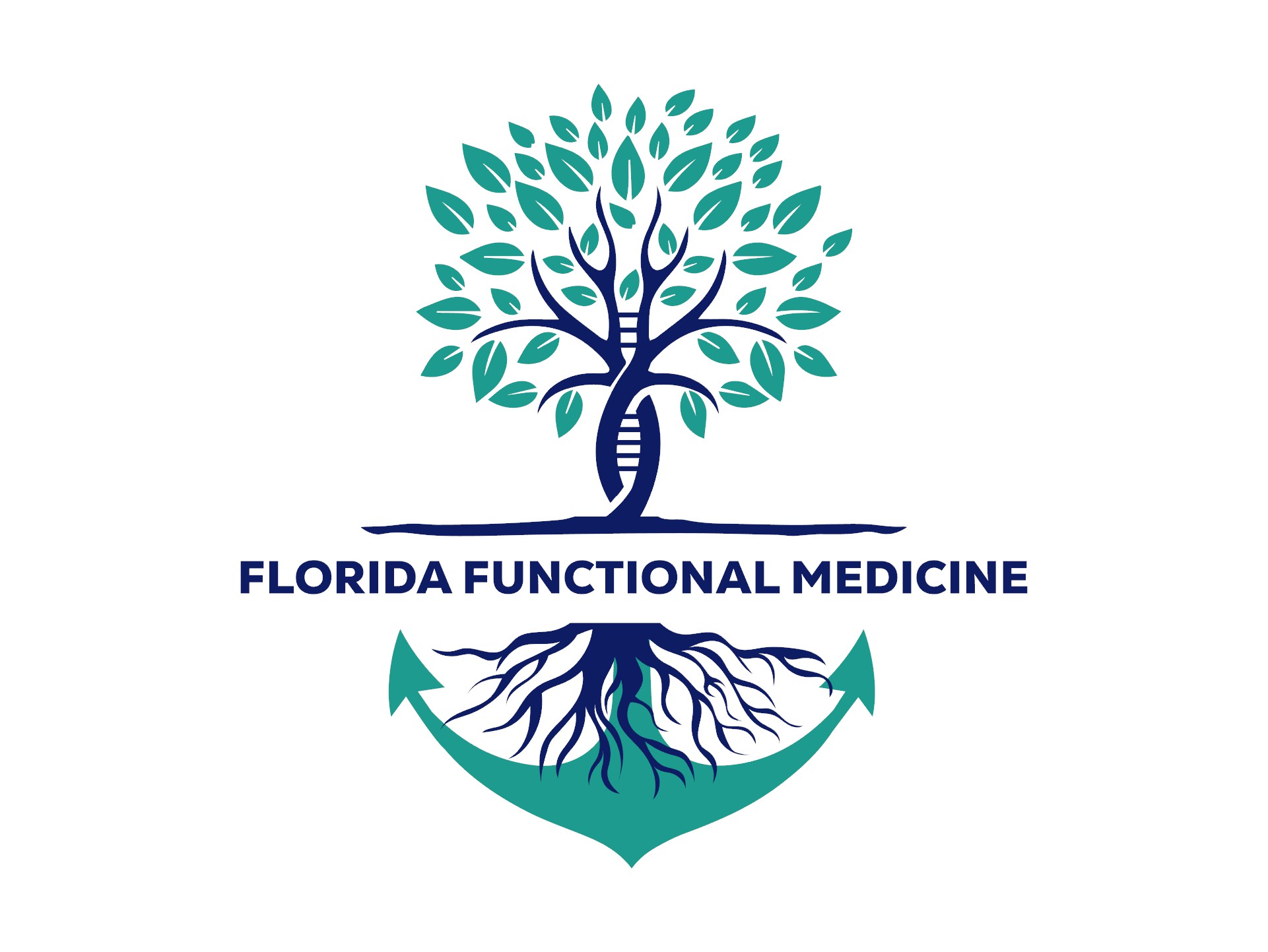
Reclaim your health from the ground up with Functional Medicine.
Your personalized pathway to wellness that honors your unique journey to vibrant health.
Revitalize your health
from the inside out with our
Functional Medicine approach
Restore your function and unlock your body's full potential
with your personalized path to wellness.
Discover the Power of Functional Wellness
It's Time to Heal &
Transform Your Life
True healing starts where chaos begins—deep in the gut.
But that’s just the beginning.
We help you uncover the real reasons behind your symptoms—whether it’s stubborn weight gain, hormone imbalance, fatigue, food sensitivities, brain fog, or “normal” labs that don’t match how you feel.
Rooted in functional medicine, our approach connects the dots between gut health, blood sugar, liver function, inflammation, mood, and more—so you’re no longer chasing surface-level fixes.
We decode the chaos in your labs, your symptoms, and your story—so you can finally experience clarity, energy, and lasting results.
IF YOU ARE SUFFERING FROM:
POOR DIGESTION
WEIGHT GAIN
BAD BOWELS
SUGAR CRAVINGS
BRAIN FOG
SWELLING
SKIN RASHES
FATIGUE
SLEEP ISSUES AND MORE...
It's time to DECODE your SYMPTOMS!
Restoring proper health doesn't have to be hard.
Introducing The Anchored Healing System
Our signature program is designed and personalized for your unique needs.
The virtual consultation, will include a thorough review of your health history, development of a strategic plan to get you started right away with recommendations for nutrition, lifestyle, possibly further lab evaluation and supplements.
Your education and coaching will begin with your unique and personalized program.
Let’s work on your gut chaos together and restore your health for good.
How It Works:
1. Discover
During the discovery phase, we conduct a thorough analysis of your overall health from head to toe, along with specialized laboratory testing. We meticulously explore biochemical patterns and environmental factors to uncover any potential threats to your well-being, leaving no aspect of your health unexamined.
2. Heal
Through personalized treatment plans tailored to your specific needs, we aim to alleviate symptoms, promote tissue repair, and restore optimal function. Our integrative approach combines evidence-based interventions, including nutrition, supplementation, lifestyle modifications, and targeted therapies, to expedite the healing journey.
3. Optimize
When we remove the barriers that are preventing the body from healing we can see amazing changes. By paying close attention to the shifts we are able to support the system in its healing process. By optimizing and making adjustments we can ensure the body has what it needs to begin to restore health.
4. Maintain
Being healthy involves resilience and the capacity to cope with life's challenges. The thriving stage of treatment is when you acquire the skills to sustain well-being amidst the demands of family, work, and other life commitments. When you feel internally balanced, you can engage with life more energetically, vibrantly, and compassionately.

Why Functional Medicine?
Functional Medicine is personally tailored for each person with a scientific based approach to healthcare. This allows us to focus on the mystifying disease and illness by uncovering the fundamental root causes.
Imagine it has a journey piecing together clues your body provides and systematically peeling away layers like an onion to guide you toward optimal health.
Hi there!
I'm Cari
Cari Caraway, MSN FNP-C is a dedicated and experienced practitioner in functional medicine.
With a focus on identifying root causes of health issues,
Cari is committed to restoring well-being and providing compassionate care. Trust in Cari for comprehensive health solutions that prioritize your individual journey to optimal wellness.

Begin your journey towards renewed health and vitality today.

Book Your Free
Chaos Decoder Consult

Let Us Create
Your Personalized Plan

Look Forward
to Better Health and Viality
If you're feeling stretched for time, energy, or finances to invest in your health presently, consider the potential consequences of neglecting it. Prevent the long-term costs of burnout and depletion that poor health may entail.
Patient Experiences
Sarah T.

Florida Functional Medicine transformed my understanding of gut health. Their Taylor program not only addressed my gut issues, but also improved my overall well-being. The virtual consultation was comprehensive, and I left with a clear plan that kickstart my journey to better health.
Francesca P.

I’m amazed by the personalized approach at Florida functional medicine. From virtual consultation to the personalized program, every step was focused on my unique needs. Their expertise in gut health and holistic wellness truly shines through their thorough assessments and strategic plans.
Vivian H.

Florida Functional Medicine goes beyond just addressing symptoms, they tackled the root cause of health issues. Their program gave me invaluable insights into my gut health and its impact on my entire body. The education and coaching provided me with the tools to make lasting changes for a healthier future.
Frequently Asked Questions
What is Functional Medicine?
Functional medicine is a personalized, patient-centered approach to healthcare that focuses on identifying and addressing the root causes of illness or imbalance in the body. It considers the complex interactions between genetics, environment, and lifestyle factors to optimize health and prevent disease.
How is Functional Medicine Different from Conventional Medicine?
Unlike conventional medicine, which often treats symptoms with medications or surgeries, functional medicine seeks to understand and address the underlying factors contributing to health issues. It emphasizes a holistic approach, aiming to promote wellness rather than just managing disease.
What Conditions Can Functional Medicine Treat?
Functional medicine can address a wide range of acute and chronic health conditions, including digestive disorders, hormonal imbalances, autoimmune diseases, metabolic issues, chronic fatigue, and more. It's particularly effective for conditions with complex underlying causes.
What Can I Expect During a Functional Medicine Consultation?
During a functional medicine consultation, you can expect a comprehensive assessment of your health history, symptoms, lifestyle factors, and environmental influences. Your practitioner will work with you to develop a personalized treatment plan focused on addressing the root causes of your health concerns.
What Treatment Modalities Does Functional Medicine Use?
Functional medicine incorporates a variety of treatment modalities, including nutritional therapy, lifestyle modifications, stress management techniques, targeted supplementation, detoxification protocols, and mind-body therapies. The approach is highly individualized based on each patient's unique needs.
How Long Does it Take to See Results with Functional Medicine?
The timeline for seeing results with functional medicine varies depending on the complexity of your health issues, your adherence to the treatment plan, and other factors. While some patients experience improvements in symptoms relatively quickly, achieving long-term wellness often requires ongoing commitment and patience.
Check Out Our Gut Healing Resources

Don’t Be Sidelined By SIBO: The Facts On Small Intestinal Bacterial Overgrowth
Small intestinal bacterial overgrowth (SIBO) is an undiagnosed condition caused by an excess of bacteria in the small intestine. The results of this bacteria overgrowth can be profound and lead to intestinal damage and nutritional deficiency. However, despite the far-reaching implications, many conventional practitioners miss the signs of SIBO. This is partly because the medical profession’s knowledge of the causes and treatment of SIBO is relatively new.
What Is Small Intestine Bacterial Overgrowth?
Bacteria play an important role in your large intestine, where they break down carbohydrates and help absorb nutrients. These processes produce a lot of gas, but the large intestine is designed to (mostly) accommodate gas production.
However, issues arise when gas-producing bacteria enter the small intestine, leading to bloating, diarrhea, and constipation – and sometimes, all three!
Generally speaking, there are three kinds of SIBO.
SIBO-D happens when bacteria produce hydrogen, leading to bloating and diarrhea.
SIBO-C is triggered by methane gas that slows down the transit time of waste products, leading to constipation.
Researchers are learning more about a third kind of SIBO, linked to excess levels of hydrogen sulfide, a gas you might recognize for its “rotten eggs” smell.
Many people experience a mix of the above, including alternating diarrhea and constipation.
Other symptoms of SIBO include:
Excessive burping
Acid reflux after meals
Bad-smelling gas
Gurgling noises in your stomach
Cramping and other discomforts
SIBO can also trigger seemingly unrelated symptoms such as joint pain, mood issues, food sensitivities, memory problems, and weight gain.
The impact of SIBO on your health
The symptoms of SIBO aren’t just annoying and uncomfortable – they can also impact your overall well-being. Bacteria in the small intestine can damage the intestinal walls and interfere with nutrient absorption. People with CIBO-D are at risk of low levels of essential nutrients like vitamin B12 and iron. And CIBO-C is often associated with weight gain.
What Causes SIBO?
Digestion is a complex process, and when something goes wrong, the effects can multiply in unexpected ways. SIBO is often the result of multiple factors and it’s not always possible to pinpoint a specific trigger.
Many medical conditions create the conditions that lead to bacterial overgrowth in the small intestine, including
Irritable bowel syndrome – by some estimates, almost 80% of people with IBS also have SIBO
Lyme Disease
Diabetes
Hypothyroidism
Scleroderma
One of the most common triggers for SIBO is bacterial gastroenteritis, more commonly referred to as food poisoning. Your body’s response to food poisoning can slow digestive motility, and in effect the movement of bacteria.
Stress is also a common contributor to SIBO, in part because stress can also affect motility and trigger digestive upset.
Diagnosing SIBO
Despite its complex possible causes, SIBO can be surprisingly easy to diagnose. The preferred diagnostic tool is a breath test that measures the hydrogen and methane gas in your breath. After following a specific diet or fasting for a day or two beforehand, you’ll drink a mix of glucose and water at regular intervals, breathing into tubes that measure gas levels after every drink.
Blood and stool tests to measure nutritional deficiencies and digestive function are sometimes also needed.
Treating SIBO
The best treatment for SIBO follows a three-pronged model designed to get to the root of the bacteria overgrowth and stop further growth. Be wary of any simple solution that merely masks the symptoms. Instead, focus on these steps.
1 - Start healing by reducing the symptoms through diet
To ease your symptoms and slow the continuing growth of bacteria, you want to eliminate the foods bacteria feed on: starches, sugars, and soluble fiber. Lean sources of protein and healthy fats can give your digestive tract a break. However, the best diet for SIBO patients can vary widely and depends on other factors such as food sensitivities and caloric needs, so it’s important to work with a healthcare practitioner.
2 - Reduce bacteria content in the small intestine
Again, this can vary a great deal by individual. Herbal antimicrobials can naturally reduce the bacteria without the side effects of antibiotics. Oil of oregano, berberine, and red thyme all have antimicrobial properties, but the exact treatment should be determined in consultation with a healthcare provider.
3 - Restore good bacteria
Our bodies require a certain amount of beneficial bacteria, so it’s important to repopulate! For many patients, this can be accomplished with probiotic supplements and a diet with plenty of fermented foods like sauerkraut and yogurt.
The symptoms of SIBO can be debilitating, but you don’t have to suffer. Because treatment is typically highly individual, it’s important to work closely with a healthcare practitioner. If you recognize the symptoms of SIBO and want to get started with treating it, don’t hesitate to call.
Sources:
Ghoshal UC, Shukla R, Ghoshal U. Small Intestinal Bacterial Overgrowth and Irritable Bowel Syndrome: A Bridge between Functional Organic Dichotomy. Gut Liver. 2017 Mar 15;11(2):196-208. doi: 10.5009/gnl16126. PMID: 28274108; PMCID: PMC5347643.
Wang SX, Wu WC. Effects of psychological stress on small intestinal motility and bacteria and mucosa in mice. World J Gastroenterol. 2005 Apr 7;11(13):2016-21. doi: 10.3748/wjg.v11.i13.2016. PMID: 15800998; PMCID: PMC4305729.
Chedid V, Dhalla S, Clarke JO, Roland BC, Dunbar KB, Koh J, Justino E, Tomakin E, Mullin GE. Herbal therapy is equivalent to rifaximin for the treatment of small intestinal bacterial overgrowth. Glob Adv Health Med. 2014 May;3(3):16-24. doi: 10.7453/gahmj.2014.019. PMID: 24891990; PMCID: PMC4030608.
Soifer LO, Peralta D, Dima G, Besasso H. Comparative clinical efficacy of a probiotic vs. an antibiotic in the treatment of patients with intestinal bacterial overgrowth and chronic abdominal functional distension: a pilot study. Acta Gastroenterol Latinoam. 2010 Dec;40(4):323-7. Spanish. PMID: 21381407.

Contact Us
888-201-8056
Privacy Policy | Terms & Conditions
Copyright 2024 - Florida Functional Medicine